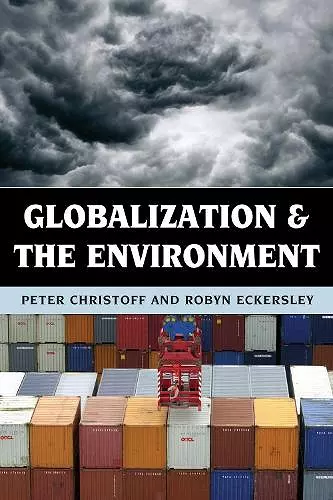Globalization and the Environment
Robyn Eckersley author Peter Christoff author
Format:Paperback
Publisher:Rowman & Littlefield
Published:8th Aug '13
Currently unavailable, and unfortunately no date known when it will be back
This paperback is available in another edition too:
- Hardback£98.00(9780742556584)

This book by two leading scholars offers the first systematic analysis of the relationship between globalization and the environment from the early Modern period to the present. Peter Christoff and Robyn Eckersley develop a broad conceptual framework for understanding the globalization of environmental problems and the highly uneven, often faltering, international political response. The authors develop linkages between economic globalization and environmental degradation and explore a range of key global environmental problems—focusing on the two most challenging of all: climate change and biodiversity loss. Finally, they critically explore the challenges of environmental governance in a world defined by global capitalism and sovereign states. Providing a normative framework for evaluating global environmental governance, they suggest alternative institutional and policy responses. Through a rich set of case studies, this powerful book will help readers grasp the systemic causes of global environmental degradation as well as the myriad opportunities for reform of global environmental governance.
Christoff and Eckersley, two of the most prominent scholars in environmental politics, provide a brilliantly lucid account of the relationship between globalization and environmental change. Managing to go way beyond simplistic accounts of globalization as either the 'menace' or the 'savior,' they show in detail how the multifaceted aspects of the phenomenon shape the dynamics of both environmental degradation and political responses to it. For an introduction to these complex issues, it is hard to beat. -- Matthew Paterson, University of Ottawa
Modernization and globalization are often dismissed as fundamental causes of our global environmental crisis. Peter Christoff and Robyn Eckersley, in contrast, convincingly argue for a radical and reflexive ecological modernization strategy to effectively mitigate climate change and global biodiversity loss. A magnificent book: superb in its thorough and in-depth theoretical analysis and highly original in its global environmental reform ideas. -- Arthur P. J. Mol, Wageningen University, the Netherlands, and Renmin University, China
Highly accessible and concise, Globalization and the Environment is a welcome addition to the literature examining the forces that have given rise to the Anthropocene. Focusing their narrative around climate change and biodiversity loss, the authors offer a historical exposé which is rich in detail yet broad in its theoretical ambition. Readers of Environmental Values are likely to find much of their worldview validated as the book chronicles the destructive forces of capitalism since the early Modern period before ending in a plea for more reflexive, deliberative forms of environmental governance. * Environmental Values *
Noted environmental politics scholars Christoff and Eckersley seek to investigate the 'claims and counter-claims' associated with the effects of the globalization of trade, production, and consumption on the intensification of climate change. The authors draw on many sources, ranging from intellectual history and social science to the history of global climate change and international policy debates. They compare human developments in the past century with 'a snake swallowing its own tail.' But they warn against narrowly conceived policies. They recognize William McKibben's The End of Nature as an eloquent first book on climate change for laypersons. But McKibben's vision of 'wilderness' is countered with critiques that such views are romantic 'Western' notions that ignore the various ways that humans have changed along with nature. The authors state that agreements by 'sovereign states based on exclusive territorial rule' are ill suited for managing a global problem. One approach they favor is international environmental governance, described as a web of understandings and practices that 'shape, and are shaped by, society and the economy.' The writing is skilled but includes conceptual complexity potentially difficult for undergraduates or nonprofessionals. Summing Up: Recommended. Graduate students, researchers/faculty, and professionals. * CHOICE *
In all aspects of Globalization and the Environment, the authors make a detailed and convincing case. They are perhaps at their strongest and most subtle in discussing the long process of modernization and globalization. Global economic integration is in some ways environmentally problematic, but the process of modernization is also cultural and includes the spread of science and the creation and spread of environmentalism itself. A global economy can facilitate the spread of capacity to recognize and a will to resolve environmental concerns, as well as the spread of the technologies that are necessary to do that. * Alternatives Journal: Canada's Environmental Voice *
There is much to praise in this book. The authors have achieved what they set out to do: clarify the complexities of globalization, by putting it into a wider historical context and reminding us of the futility of dogmatic dualisms. Their analysis is conciliatory without denying the incompatibility of neoliberalism and ecology. Globalization and the Environment is a valuable addition to the literature. * Biological Conservation *
[An] incisive study on the relationship between globalization and the environment….Globalization and the Environment is a thorough examination of the origins and nature of the environmental crisis. The authors’ concept of an ‘accountability deficit,’ in particular, is highly useful to understanding why a constructive response to the crisis is so hard to galvanize. As academics describing and dissecting a social phenomenon, Christoff and Eckersley succeed masterfully. * Green European Journal *
Highly accessible and concise, Globalization and the Environment is a welcome addition to the literature examining the forces that have given rise to the Anthropocene. Focusing their narrative around climate change and biodiversity loss, the authors offer a historical exposé which is rich in detail. . . .I am very likely to include the book in the reading list next time I offer a course on global environmental governance or a similar topic. * Environmental Values *
ISBN: 9780742556591
Dimensions: 225mm x 153mm x 20mm
Weight: 408g
268 pages